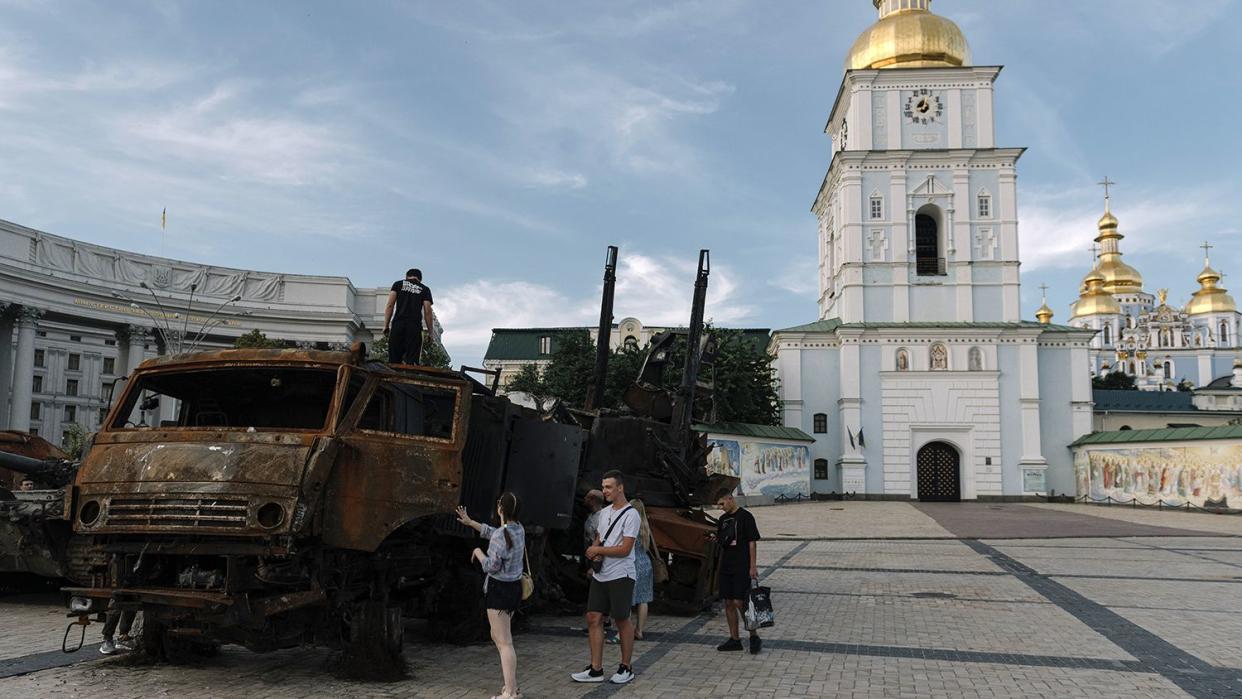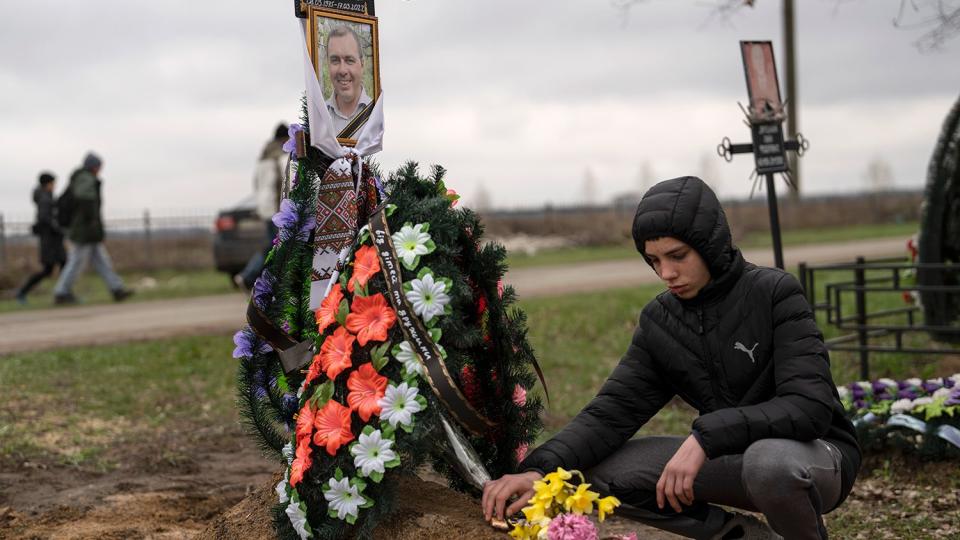Ukrainian Independence Day Arrives 6 Months into Russia's Attempt to Strip the Country of Sovereignty

Wednesday is Ukrainian Independence Day — the anniversary of Ukraine's freedom from Soviet rule in 1991 — but this year the holiday comes at a particularly troubling time, as residents fight to ensure it isn't their last.
Aug. 24 falls on the six-month mark of the current Russian invasion. Fears that Russia will step up missile attacks on major Ukrainian cities this week prompted Kyiv and other cities to cancel Independence Day celebrations so security forces can respond efficiently.
RELATED: U.S. Embassy in Ukraine Urges Americans to Leave Country Immediately: 'Conditions May Deteriorate'
Half a year into the Russian invasion, troop and civilian casualties are in the tens of thousands, and bombs are still falling on Ukraine. "What might surprise a lot of people is that the whole country isn't a battlefield — right now the battlefield is in one specific area," says Robert Minton, who teaches English to Ukrainian professionals and was living in the country until he was warned to leave in February.
Still, he tells PEOPLE, the entire population is affected. "Inflation is 30 percent, and the currency is really hurting too," he says. Some businesses are running out of money. "Everything is more expensive and even if (you're in Kyiv or western Ukraine and) missiles aren't coming down, those sirens are loud — it sounds like the world is ending. In a lot of regions (the sirens go off) more than once a day. It's very taxing."

Andrew Kravchenko/Bloomberg via Getty Remnants of Russian vehicles line the streets of Kyiv, a reminder to all of Ukraine's strength
"Everyone's going through something different, everyone's going through a very specific difficult time, whether it's family members died in the war, or your dad's in the army and he's never shot a gun before, or your business needs to close down, or rent prices are really high, or you're displaced, or you just want to go back to normal life but you hear all these sirens," he says. "It's not just hearing bullets — a lot of different aspects of life are completely upended."
Yet Ukrainians love their democratic country, Minton says. They have suffered from Russian aggression for years and most have become extremely resilient. "My student was at a playground and there was a bomb nearby and nobody flinched," he says.

Petros Giannakouris/AP
Minton, now 26, began work in the Peace Corps in 2018, assigned to western Ukraine. While there, he taught English and met a local woman, Alina Yuska, now 25, through a dating app. When COVID hit in 2020, the Peace Corps sent him home to the U.S. But three months later he was back, living as a private citizen and teaching English. By 2021, he and Yuska were living in an apartment in the far west, on the border of Slovakia. "We were getting into decorating," he says of the happy time.
Last November, he was at the gym when he read that Ukraine's Minister of Foreign Affairs Dmytro Kuleba warned of a potential Russian invasion. It was tempting to dismiss the message because months before, Russia had amassed troops at the border and nothing happened — only it was indeed concerning that Russia was transporting blood and transfusion equipment to the border, as well as mobile crematoriums, Minton says.
By January, people were urging Minton to leave. On Feb. 2, he and Yuska married.
"I love you Alina Yuska and I can't wait to spend the rest of our lives together. The past few years have been that much sweeter with you at my side and I'm so excited to see where life takes us," Minton wrote in a Facebook post.

Courtesy of Robert Minton Robert Minton and Alina Yuska
A week and a half later the U.S. government warned that Russia was about to invade. He and Yuska packed two suitcases each, left everything else in their apartment, boarded a regularly scheduled bus to Slovakia, and began a life of displacement before the Russian invasion commenced.
The couple made their way to Prague in Czech Republic, and Minton continues to teach English online to Ukrainians. Yuska is able to go back and visit her family and travel out again, unlike Ukrainian men who are not permitted to leave the country.
Minton has kept in touch with more than a dozen friends and students in Kyiv and western Ukraine, where disruptions include sirens and missiles but are not as severe as the constant bombardment that people in the east face.
"People are moving back to Kyiv, they're going to happy hour again, they're doing their jobs," he says. "You can't forget the war. There's a heightened military presence. But it's been six months. People are trying to get back to their lives."
When blaring sirens still go off several times a day in the capital city, Kyiv, they are often ignored these days. Rockets and missiles are typically not hitting the city, and many people are trying to work and have stopped racing to the basement at each warning. "It's very easy to get used to something, and people aren't going to live in fear 24/7," Minton says.
RELATED VIDEO: Life Goes on in Kyiv, Where Residents Are Resuming Normal Activities amid Ongoing Russian Threat
At the same time, some young adults are constantly stressed and irritated, especially those feeling "torn between staying in the country they love that is going through an economic catastrophe versus moving to a different country where you don't know anyone, and becoming a refugee," Minton says.
Many have stayed because it's easier. "It's more than loving Ukraine and being nostalgic. Being a refugee is incredibly difficult. Documentation, getting a job, finding housing, it's more expensive," he says.
That may be the reason many residents in the war-torn eastern and southern regions have chosen to move within the country, migrating to western Ukraine for safety. Beds have been set up in schools and gyms in Zakarpattia, the region where Minton and Yuska were living.
"It's hard to find private housing, and it's really hard to pay for, especially if you lost your job due to the war," Minton says. Nevertheless, "There's a place to stay for everyone and there's definitely a lot of food support, free meals, food pantries, humanitarian aid," he says.
While western areas may feel safe from Russian bombs, Minton has heard that men walking in public there have been stopped and handed draft notices for the Ukrainian military. It's forcing many men to hide inside. "It's like COVID all over again, but way more terrifying," Minton says.
A student of Minton's thought about moving west until her mother warned, Sure, but you can't escape war. "That's just not something you can do," Minton says.
Never miss a story — sign up for PEOPLE's free daily newsletter to stay up-to-date on the best of what PEOPLE has to offer.
Whether they stay in their hometown, move across the country, or — for women and children — leave Ukraine, everyone is living in limbo. They can't even be certain where they'll be living a few months from now.
"People are unable to make any long term plans at all — that's something I share with them," he says. "Name anything that someone would try to plan and due to the war they're not able to do it. Whether it's a vacation, whether it's buying an apartment, having a child. There's so much uncertainty that the most you can do is just continue working and basically survive."
At the outset, Ukrainians crafted homemade Molotov cocktails to help with the war effort. Today, Minton says many young people are making weekly financial contributions to the army, and, after decades of Soviet and Russian efforts to bury the Ukrainian language, there is a push for Russian-speaking Ukrainians to learn it.
"A lot of people have accepted the situation and are doing their best to continue with their lives," Minton says. "They're not moving on, because you can't move on, because it's happening. But a lot of people are continuing and trying to find fulfillment, just like us."
The Russian attack on Ukraine is an evolving story, with information changing quickly. Follow PEOPLE's complete coverage of the war here, including stories from citizens on the ground and ways to help.

 Yahoo News
Yahoo News 
